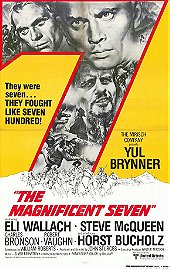THE MAGNIFICENT SEVEN, MGM, 1960.
Dir. John Sturges. Perf. Yul Brynner, Eli Wallach, Steve McQueen, Robert Vaughn, James Coburn, Charles Bronson, Brad Dexter, Horst Buchholz.
Review by Samu Rahn
It is uncommon for a film to succeed when it tries to be many different things at once. In The Magnificent Seven, classic Western vistas and iconic heroes are melded with a Japanese plot structure and underlying ideology, whimsical humor is tempered by abrupt violence, and a charming moral of altruism is shot down, literally, by the realistic misgiving of selfishness.
The cast is a dream team of 60s real men, led by Eli Wallach as the bandito Calvera and Steve McQueen and Yul Brynner as the gunslingers who head up the resistance party. With a supporting cast that includes James Coburn, Charles Bronson, and Robert Vaughn, it would have been frightfully easy (and no doubt more lucrative at first) if the direction had simply made each character a poster-boy cutout of the actor who played him. Even though a number of these actors, McQueen included, had yet to leave a serious mark on cinema history, their personalities and faces were striking enough for the poster-boy approach to have been viable. But then, The Magnificent Seven might just have been a lesser presage of Ocean’s Eleven (2001) or Ocean’s Twelve (2004), more specifically: rich characters whose development is ignored in favor of the actors’ own egoism and panache. Such a film would have been banal, and the climactic gunfight, where most of the seven meet their ends, would have seemed like coy theater antics.
Instead, director John Sturges uses a trenchant script, largely written by the uncredited Walter Newman, to unearth each character’s heart with a few swift lines. These nuggets of discovery, either of the self or of each other, are embedded within the plot, allowing the characters to grow into the narrative rather than alongside of it. In this way, the climax of the film is justifiable to the audience and compelling, as each character becomes fully defined. Some by how they embrace their survival, others by how they meet their death.
Through its first few acts, though, The Magnificent Seven progresses in an almost lackadaisical manner, as if the imminent gunfight with Calvera is nothing more than a backyard scuffle between cowboys and Indians before supper. Elmer Bernstein’s iconic score is largely responsible for supporting the uplifting mood that carries the majority of the film, giving each character’s story a flavour of high adventure and entertainment. The scenes of weapons training, scouting missions, and occasional scenes of pure dialogue are mostly upbeat, recalling another McQueen film yet to be made, The Great Escape (1963), in how dire circumstances can be lightly cast. This, aside from making The Magnificent Seven simply more fun to watch, also preserves an audience’s energy for the unexpectedly cutting climax and a final note of poignant stoicism.
After all, this Western is neither drama nor comedy, but rather at a lonely point in between where the humor is wry, the pathos swift, and the icons everlasting. While The Magnificent Seven is not the most groundbreaking or influential Western ever made, its qualities may certainly make it the most timeless.
10/10
 Login
Login